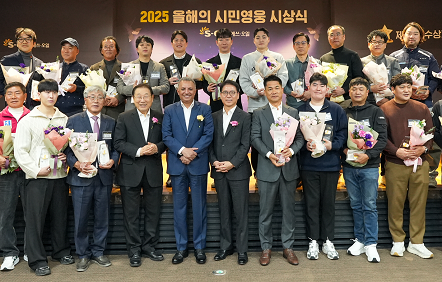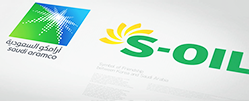
Communication with Stakeholders
ESG management at S-OIL starts from communication with stakeholders. S-OIL conducted surveys, interviews, and meetings with stakeholders to identify their expectations and to introduce its management policies as presented by top management.
Corporate Governance
S-OIL has established the most transparent and sound corporate governance among listed companies in Korea and a trusting relationship with its stakeholders by organizing the Board of Directors and its committees with diversity, independence, and rich expertise, and ensuring checks and balances in business operations.
Balance between Diversity and Independence
S-OIL nominates director candidates with expertise and diversity including nationality, race, gender, etc. in accordance with internal procedures, to ensure that various stakeholders' interests are duly represented and mutual complementation among directors can be maintained. Candidates are officially appointed as directors at the general shareholders' meeting. Based on the essential competencies of the BOD, the Company selects candidates through verification of their vision, leadership, expertise, and work experience, as well as their capabilities and qualities for independent and objective BOD activities. Further, to ensure the independence of the BOD, a candidate is also screened for factors that may be material to that his/her ability. Thus, whether he/she is working or has been working for S-OIL in the past five years, whether he/she is engaging or has been engaging in any audit or consulting service for S-OIL, and whether he/she has any material relationship or transaction with S-OIL are comprehensively taken into consideration. For outside directors, in particular, the Outside Director Candidates Recommendation Committee (ODCRC) recommends the most suitable candidates with independence, after evaluating candidates in accordance with internal standards to confirm that they have no vested interest in S-OIL or any other reasons for disqualification. The BOD leverages the expertise and diverse experience directors bring in the various fields of oil industry, renewable energy, international trade, finance, etc. and two female directors have been serving on the board since 2019, further improving its diversity. Having served in various fields, such as the government, industry, and academia, directors with rich experience and capability in the energy and chemical industry will significantly contribute to enhancing the diversity and independence of the BOD.
Independency Policy of Outside Directors
To help the BOD conduct independent and objective decision-making for the protection of the rights of shareholders and investors, S-OIL appoints a majority of directors as outside directors who satisfy the following independency policy (disqualification reasons). Outside directors lose their posts when they cannot meet the independence policy.
- Directors, executive officers and employees who are engaged in the Company, or directors, auditors, executive officers and employees who have engaged in the Company within the last five years;
- The principal, his/her spouse, lineal ascendants, and lineal descendants, in cases where the largest shareholder is a natural person;
- Directors, auditors, executive officers and employees of a corporation, in cases where the largest shareholder is the corporation;
- The spouses, lineal ascendants, and lineal descendants of directors, auditors, and executive officers who have engaged in the Company or a parent company and a subsidiary of the Company within the last three years;
- Directors, auditors, executive officers and employees who are engaged in a parent company and a subsidiary of the Company within the last five years;
- Directors, auditors, executive officers and employees of a corporation in an important interest such as a business relationship with the Company as follows;
- The Company's important customers, suppliers and related persons;
- A corporation that concludes an advisory agreement such as legal advice, management consultation, etc. with the Company or top management of the Company;
- A corporate that contracts a private service agreement with the Company or top management of the Company;
- An accounting firm that has been the auditor of the Company within the last three years;
- A non-profit organization and related persons that receives important donations from the Company, etc.
- Directors, auditors, executive officers and employees of another company for which directors, executive officers and employees of the Company serve as directors and executive officers; and
- A person who is determined to undermine the independence of the BOD due to other interests with the Company or who is otherwise unable to faithfully perform his/her duties as an outside director
Reinforcing BOD Expertise
To enhance the expertise of the BOD, S-OIL regularly conducts a briefing session to support the BOD's decision-making, including general content such as changes in the business environment, business strategies, risk factors, and risk management measures. Directors are provided with a monthly report on economic, social, and environmental issues that may affect the Company's sustainability. The BOD operates four committees (Board of Audit Committee (BAC), Compensation Committee (CC), ODCRC, and ESG Committee (ESGC)) to support the its independence and efficient decision-making. The Management Committee, which supports the CEO, contributes to S-OIL's sustainable growth by analyzing critical economic, social, and environmental issues in advance to ensure the BOD's sound decision-making in all areas including business plans, budget, and labor policies. In addition, S-OIL evaluates the BOD and outside directors through self-evaluation on an annual basis.
Balance between Checks and Collaboration
S-OIL establishes sound and transparent corporate governance led by the BOD and its committees, ensuring a balance between checks and collaboration. The majority of directors are appointed as outside directors who have been vetted for independence according to S-OIL's internal policy. An independent outside director has served as the chairman of the BOD since 2015, and all members except for the CEO who is an inside director are non-standing directors. This ensures decisions are made in a manner that maximizes value for various stakeholders based on the objective and independent functioning of the BOD to oversee and check the management activities and performances of the CEO and the Company. The Company makes sure the BOD meeting participation rate of each director stays over 75% annually barring exceptional circumstances so that checks and collaboration can be achieved through active participation of directors. In addition, the BAC, which is comprised entirely of outside directors, evaluates general matters relating to management activities and the operational status of the Internal Accounting Management System, and receives reports on internal audit performance.
S-OIL prohibits its outside directors from serving as directors of two or more companies in addition to the Company, and all outside directors fulfil this requirement.
Independent and Transparent Policy on Executive compensation
S-OIL grants compensation to all executives based on an objective and transparent process to ensure that all executives, including the CEO, are committed to protecting shareholder value and fulfilling the Company's role as a corporate citizen. Comprised of non-standing and outside directors to ensure the independence and fairness of compensation decisions, the Compensation Committee (CC) convenes annually to ensure that the level of compensation paid to executives is appropriate, and determines compensation based on the achievement of objectively established short- and long-term goals. The CC comprehensively considers the achievement of short-term management performance targets, such as ROACE and EBITDA, and mid- to long-term management performance targets consisting of financial indicators such as 3-year Total Shareholder Return (TSR), to determine the level of individual variable compensation for all executives. The Company also transparently discloses the basis and amount of directors' compensation through its business reports.
Charter of Corporate Governance
- Download Charter of Corporate Governance
- View PDF
Compliance and Ethics Management
Guided by its core value of Integrity, S-OIL places compliance and ethics management as its top priority and incorporate them in the day-to-day business of all employees. The Company ensures that all employees are well informed of and adhere to relevant domestic and international laws and regulations, as well as internal regulations, in the course of their work. With a dedicated organization consisting of legal experts, S-OIL thoroughly review legal issues and contractual matters to prevent legal disputes in advance, and even in the event of a dispute, the Company maintains trust with its stakeholders through providing optimal countermeasures, while making efforts to prevent the recurrence of the same issues by offering in-depth legal assistance and reinforcing training.
Compliance Management as Corporate Culture
Led by the strong commitment of top management to compliance management and the active involvement of employees in practicing it in their daily work, S-OIL has embedded compliance management in its corporate culture. All employees incorporate compliance standards into their daily work and give it the highest consideration before performing their duties. The Company regularly reports major compliance activities to top management, thereby drawing attention to the importance of compliance management. In addition, S-OIL raises employee awareness of compliance by distributing compliance newsletters, disseminating compliance trends led by global companies, and providing various compliance programs such as compliance campaigns. To further strengthen compliance management, the Company conducts in-depth analysis of laws and regulations, develop guidelines, and provide customized training.
Systematic Compliance System
S-OIL takes a systematic approach to compliance management, utilizing profiles and checklists for company-related laws and regulations to help employees practice compliance management. Through the IT-based compliance system, the Company provides information on the latest legislations and revisions to relevant employees in real time, making it convenient for employees to search or inquire legal information relevant to their work, and conduct compliance activities autonomously through regular or ad hoc inspections.
ISO 37301 Certification for Compliance Management System
S-OIL strives to practice proactive compliance management to ultimately promote sustainability and become a leading company in ESG management. On May 13, 2021, the Company became the world's first company to be certified to ISO 37301, the international standard for compliance management systems, and have since maintained this certification through annual follow-up audits. This means that the Company's compliance system is operating effectively and successfully for the systematic practice of compliance management.
Established by the International Organization for Standardization (ISO) in April 2021, ISO 37301 sets out requirements and guidelines for establishing, developing, implementing, evaluating, maintaining, and improving an effective compliance management system. S-OIL's efforts to practice compliance management and establish a culture of compliance for all employees through the introduction of the compliance support personnel system in 2013 and the systematic compliance system in 2014 resulted in the world's first ISO 37301 certification in 2021 and recertification in 2022. Going forward, the Company will continue to maintain, supplement, and intensify its compliance management practices through the certification.
Systematic Ethics Management
S-OIL pursues systematic ethics management with the society based on three organically connected pillars: Ethics Code, Ethics Committee, and Ethics Management training. The Company closely monitors domestic and international trends such as the Anti-Graft Act and the Workplace Harassment Prevention Act, and preemptively reflect in its Ethics Code, and all employees regularly submit a pledge of ethical compliance.
In 2021, S-OIL enhanced the structure and content of its Code by benchmarking it against global best practices. The Company specified the types of discrimination prohibited, including race, nationality, gender, and age, and improved the content related to information protection, protection and proper use of company assets, safety, health, and environmental policies, fair competition, prohibition of insider trading, anti-corruption/anti-bribery, and whistleblower protection. Its Ethics Code extends to suppliers, subsidiaries, and investment companies, and the Company's suppliers are obligated to submit an Ethics Compliance Pledge that they will comply with the Code. Should a supplier be found to be in violation of laws and regulations or engage in unethical behavior, it may be disadvantaged or excluded from transactions with S-OIL. In addition, the Company operates a whistleblower protection system as well as an anonymous reporting channel and a self-reporting liability reduction system to encourage reporting of ethical management violations.
In 2022, there were 3 Ethics Code violations and S-OIL took disciplinary measures against 7 employees in accordance with relevant regulations and procedures. Violation cases were also shared across the company and covered in training for recurrence prevention purposes
Since 2004, S-OIL has operated the Ethics Committee consisting of Legal & Compliance HQ Head, Corporate Planning Division Head, HR Division Head and Controller. They are appointed by the CEO after being screened by the BAC for eligibility. The Committee is responsible for supervising ethics management activities, establishing ethics policies and programs, and elevating ethics awareness in the organization. In particular, for cases where stakeholders of employees with high chances of conflict of interests transact with the company, the Committee must review it to prevent any violation of Ethics Code. The Committee reports activities to the CEO and the BAC on a regular basis, while disclosing its activities to stakeholders through Ethics Management website. Since 2018, S-OIL has conducted ethical management assessments for stakeholders including employees, service stations, LPG filling stations, corporate clients, and suppliers on the Company's overall ethical management, including ethics awareness, respect for employees/customers/suppliers, abuse of dominant position, fairness in business dealings, and any experience with corruption, and reflected the assessment results in company policies to improve ethics management.
Starting from 2009, S-OIL offers ethics management training tailored for different job grades and functions to raise employees' ethical awareness in their day-to-day work while inviting outside experts for special lectures. In 2022, reflecting the result of stakeholder evaluation on S-OIL's ethics management, 5 courses on ethics management were offered as well as case-based marketer training for sales offices that have a high chance of committing an ethics violation due to frequent encounters with business partners. Also, the Company has offered ethics management training for suppliers and affiliated companies since 2013 to help them understand the basic principles of Ethics Code, thereby raising the quality of ethics management across the supply chain.
In 2022, S-OIL customized training contents by reflecting the Ethics & Regulatory Compliance Framework (ERCF), the ethical compliance standards of Saudi Aramco, the Company's largest shareholder, as well as the latest trends in ethics management and actual cases, and conducted e-learning training. The Company has also been operating the Ethics Management Self-Diagnosis System since 2015 to enhance employees' understanding of its Ethics Code.
- Code of Business Ethics and Conduct
- View PDF
Ethics Management Help Desk
- Tel
- 82-2-3772-5231
- Fax
- 82-2-3772-5239
- e-mail
- ethics@s-oil.com
- Website
- ethics.s-oil.com
Compliance Monitoring System
S-OIL introduced the compliance monitoring system on internal regulations in 2011 to help employees understand corporate regulations and abide by them in their daily work, thereby minimizing any confusion and risks associated with non-adherence. Currently, the Company carries out compliance monitoring activities against 120 checklists on 38 regulations twice a year. The results are reflected in the performance assessment of all executives and team leads to encourage employees' voluntary compliance with internal regulations. In 2022, zero violations were identified through compliance monitoring.
Risk Management Activities
S-OIL has established and implemented a well-organized risk management system to proactively respond to potential risks that may compromise its economic, environmental, and social values and grow together with stakeholders. In addition, S-OIL's rigorous internal auditing enhances transparency in its business and rectifies any improper practices and inefficient cost structures.
Enhancement of Risk Management System
Since 2008, the Company has operated an advanced risk management system that enables all members of the company to carry out optimal risk management activities for all risk factors that may arise in its business activities, thereby facilitating prompt and effective responses to risks.
Enhancement of Risk Management System
| Enterprise Risk Management (ERM) |
Managing key risks with enterprise-wide impact |
| Emergency Control Program (ECP) |
A program to ensure a quick and effective response in the event of an emergency |
| Early Warning System (EWS) |
Enhancing monitoring and prevention of business-as-usual risks that may arise at any given time |
| Internal Accounting Management System (IAMS) |
Internal control process to ensure the reliability of financial information |
The ERM Committee is an independent committee that consists of senior executives, including the CEO, and sets the direction of enterprise-wide risk management and periodically checks the progress to ensure that the Company's management policies and risk management activities are strategically aligned. Significant issues related to risk management, including internal control reviews, are reported to the BOD and incorporated into strategic risk management policies.
In order to prevent risks that may hinder the achievement of management goals from materializing, S-OIL designates risk owners to systematically manage the process of identifying, evaluating, monitoring, and responding to risks. Since 2020, S-OIL has actively been operating ERM sub-committees for production, marketing, strategy, finance, and IT to review and support risks response activities of risk owners and make recommendations to the ERM Committee for effective risk management. On a quarterly basis, the ERM Committee conducts a final review of risk management activities carried out by risk owners and makes decisions on necessary responses and enterprise-wide policies. In addition, starting in 2021, S-OIL expanded the major risk issue management that had been selectively implemented since 2015, to conduct a comprehensive environmental analysis related to each major risk every quarter led by the risk owner, so as to effectively detect potential risks early on and responding to them proactively.
The ECP is a company-wide emergency preparedness system that serves to swiftly minimize damage to people and property in the event of an emergency. S-OIL has established Emergency Control Centers at major business sites and periodically perform emergency drills to strengthen its emergency response capabilities. In 2022, a company-wide emergency drill was held to examine and improve emergency preparedness against fires in production processes and personal accidents.
The EWS is a system that monitors the vast amount of data generated during daily operations and enables preventive response. The EWS is used to check for abnormalities according to 62 predefined scenarios, and quickly transmit the detected abnormalities to the relevant personnel for proactive risk review and response, preventing risks from escalating or worsening at an early stage.
The IAMS ensures that the internal control process is checked in accordance with the Act on External Audit of Stock Companies and best practices for internal accounting management systems to ensure the reliability of financial information. S-OIL regularly evaluates internal controls for their effectiveness in design and operation, and provide annual training to improve employees' ability to operate IAMS.
Strategic Management of Mid- and Long-Term Risks
S-OIL proactively prepares for changes in the internal and external business environment that could have a significant impact on the Company in the mid- and long-term by systematically analyzing and forecasting changes in the internal and external business landscape, and formulating and implementing corresponding strategies by conducting annual mid- and long-term business environment analysis, quarterly risk assessment and monitoring, and sensitivity analysis and stress testing for major financial and non-financial risk items.
First, S-OIL recognizes a border carbon tax as a strategic risk in the mid- and long-term. The EU and the US are pushing for its adoption, and Korea is also moving toward internalizing carbon costs through the K-ETS (Emission Trading System). Unfortunately, the carbon-based energy industry, of which the Company is a member, is inevitably exposed to enormous carbon cost risks. Accordingly, when the border carbon tax is introduced, its cost structure will be significantly affected in the long term, depending on the internalization of carbon costs. Having emitted 9,710 thousand tons CO2eq (Scope I+II) of greenhouse gases in 2022, S-OIL plans to achieve a 35% reduction in carbon emissions compared to BAU by 2030.
In addition, S-OIL views the shrinking population of Korea and its impact as a strategic mid- to long-term risk. Approximately 50% of the Company's revenue is generated in Korea, and more than 99% of its employees are Korean nationals. Yet, Korea is facing a population cliff with a total fertility rate of 0.78 in 2022, a trend that has no parallel in the world. This represents a significant decline in the Korean consumer population, which accounts for a large portion of the Company's sales, as well as an aging workforce, making it more difficult for the Company to locally recruit young and talented employees. In response, S-OIL continuously diversifies its products and customers to grow both domestic and overseas sales, and strive to enhance the attractiveness of its company as a place of employment with competitive employee benefits and compensation in order to effectively recruit young and talented people.
Operating Effective Internal Audit System
There is an audit organization directly under the Audit Committee to ensure the independence and expertise of internal audit. The Audit Committee directly appoints external auditors and evaluates the internal accounting management system through an independent and objective evaluation in accordance with the relevant procedures for appointing external auditors and the IAMS evaluation.
Based on its extensive experience and in-depth understanding of the business, the audit organization focuses on maintaining a sound internal control system and improving inefficient work processes and cost structures. For efficient and effective internal audit, S-OIL ranks risks by organization or business process, taking into account the size of risks and exposures, controls in place, and audit effectiveness, and formulate a five-year audit plan accordingly. Audit organization then carries out regular internal audits at least every two to five years based on risk assessment results for all organizations across the board in accordance with the five-year audit plan approved by the Audit Committee, and conducts special audits for potentially significant risks. Also, the Company shares past audit cases with business organizations and strengthen follow-up activities for audit recommendations to prevent similar cases from recurring.
Internal Audit Cycle Following Risk Assessment
-

4~5year cycle
-

3~4year cycle
-

2~3year cycle
To encourage reporting and protect informants, S-OIL actively informs employees, business partners, and suppliers of the Company's ethics management policy and reporting hotline. For reports received, the Company thoroughly verifies and investigates them and follows up on cases that are confirmed to be valid for recurrence prevention and improvement. S-OIL also continuously revises internal audit policies and procedures, strengthen internal controls, and raise employees' compliance awareness and self-audit mindset through regular and ad hoc audits based on a risk-based audit plan.
In 2022, the Company further strengthened internal controls for preventing financial irregularities by reviewing the risks associated with its fund deposits and withdrawals and improving the relevant processes, drawing on embezzlement cases that occurred at other companies in Korea, as well as strengthening security controls to prepare for the growing cybersecurity threats.
In 2018, S-OIL received the highest grade of Very Satisfactory in the internal audit quality assessment conducted by Artner Consulting, an independent external expert, in accordance with the Institute of Internal Auditors Standards, with the aim of improving the quality of the audit function and the audit business in general. To continuously reinforce the competence of the audit organization, the Company actively supports the participation in various training programs and the acquisition of professional certifications, and it have developed and implemented a plan to strengthen IT-based audit capabilities, such as monitoring abnormalities and issues requiring improvement around the clock through in-depth data analytics using Audit Command Language, a specialized audit software.
As such, S-OIL promotes corporate value through an exemplary audit system, including an objective and independent audit committee and audit organization, an effective audit system on par with global leading companies, and audits that focus on process improvement.












